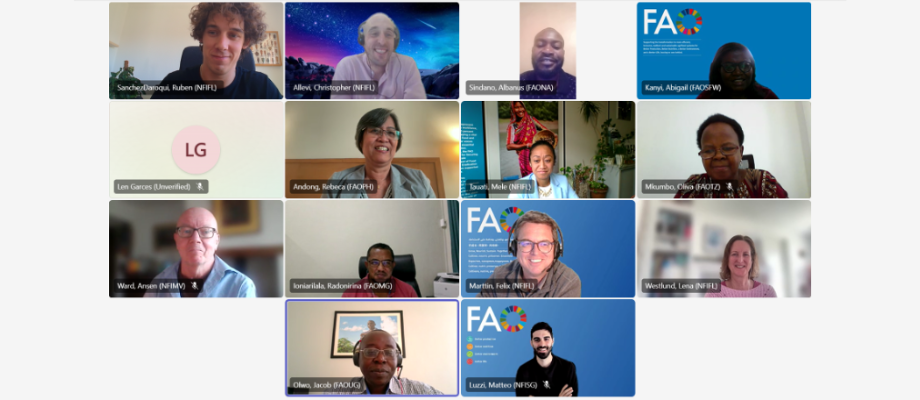Progress and achievements are presented during the quarterly meeting of the Implementing the Small-Scale Fisheries Guidelines for Gender-Equitable and Climate-Resilient Food Systems and Livelihoods project

©FAO
The quarterly meeting of the FAO-led project “Implementing the Small-Scale Fisheries Guidelines for Gender-Equitable and Climate-Resilient Food Systems and Livelihoods – Phase 2” was held virtually on 16 April 2025. It brought together national coordinators from Ghana, Madagascar, Namibia, the Philippines, Tanzania, and Uganda alongside FAO headquarters staff.
The meeting aimed at checkpointing on progress, as the project is about to reach its final semester. Most project logframe targets have been met or exceeded thanks to dedicated implementation teams in the various country offices and the collaboration with small-scale fisheries and government counterparts.
Country updates showcased a range of achievements
Ghana reported 31 community trainings reaching over 1,500 participants, 35 women empowered in financial literacy and entrepreneurship, and the SSF Guidelines translated into a new local language. Plans are underway for a National Plan of Action for Small-Scale Fisheries (NPOA-SSF).
Madagascar is finalizing the procurement and installation of an ice machine for the national women’s assoction RENAFEP and equipment to support women in post-harvest processing. A key challenge remains engaging more stakeholders in promoting the NPOA-SSF.
Namibia hosted two workshops for its National Task Force for implementing the Namibia NPOA-SSF and identified priority areas such as SSF policy development and resource mobilization.
Philippines reported successful community training and concluded the first phase of a strategic messaging workshop on the NPOA-SSF. Key next steps include Monitoring & Evaluation of the implementation of the NPOA-SSF so far and the development of a co-management .
Tanzania highlighted its success with Village Community Bank (VICOBA) groups for the Tanzania Women Fish Workers Association (TAWFA) and reported on the support to the groups including procurement of materials (cashboxes, calculators etc) required to successfully run said groups. The VICOBA training has contributed to empowering the women and helped them run their processing businesses more effectively.
Uganda held a national stakeholders' NPOA-SSF conference and supported the promotion of the SSF Guidelines at national events such as the Jinja Fish Festival and the National Agricultural Show. Despite donor engagement challenges, strong political support and youth involvement offer hope for sustaining momentum.
A thematic discussion underlined identified common challenges such as limited funding for NPOA-SSF implementation and youth engagement. Successes included effective financial literacy programs, increased grassroots participation, and innovative savings group models.
Final steps
Plans are in motion for a Global Learning Exchange Workshop in Tanzania in November, aimed at facilitating peer learning and showcasing successful women and community-driven practices in post-harvest technology, co-management, and alternative sources of energy.
In closing, participants were reminded to begin working on the closure of activities, finalize procurements of equipment and infrastructure, updating monitoring systems and document impact stories, especially those highlighting youth involvement—as the project heads toward its final quarter.
Learn more:
- Implementing the Small-Scale Fisheries Guidelines for gender-equitable and climate-resilient food systems and livelihoods – Phase 2 project
- Where we work
